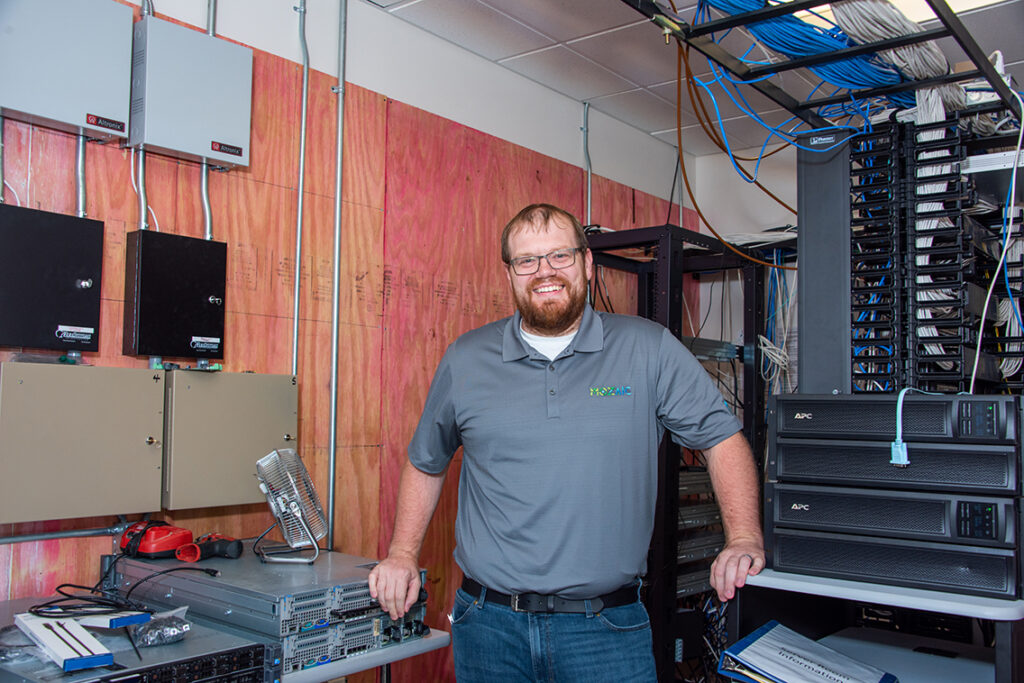
As assistant IT director for Mozaic in Waterloo, Adam Keuer ’13 enjoys designing the computer networks that help his colleagues at the human service agency get their work done.
“I have always been a very logical thinker,” he said, referring to the tasks involved in getting computers to talk to each other efficiently and securely. “It feels like home for me.”
Home took a while to find. Adam logged a years-long trek through three majors at two other colleges and a detour into retail management before finding his way to FLCC’s networking and security program.
His story is not uncommon among the College’s IT alumni, some of whom found their niche in unexpected ways.
-
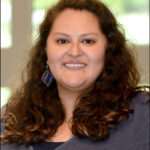
Katherine Gonzalez ’17 Katherine Gonzalez ’17 spent a decade bartending and waitressing before giving IT a try. Today, she is an administrator for a customer relationship management software at Canandaigua National Bank and Trust and helped lead the project to add a chat function to the CNB website.
- Samantha “Sam” DeWeese ’14 planned to become a math teacher then discovered computer science. She moved from a teller position at Canandaigua National Bank to computer support and now works alongside Katherine.
-
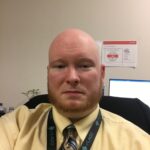
David Weir ’16 As David Weir ’16 recovered from a serious injury, a vocational rehabilitator advised him to enroll in something that would lead to a desk job. He is currently a junior network administrator at Crosman Corp. in Bloomfield.
These newer arrivals join longtime practitioners like Marty Bognanno ’90, information technology manager for Navitar, a family of three optics companies; Karen Weimer ’16, an IT engineer and system administrator at Frontier; and Kimberly Alessi ’18, an IT security engineer, also at Frontier. All three have been intentional about keeping their skills sharp and their minds open to new opportunities.
“As you go along, you realize the field is so vast that you can’t possibly know everything. You will forge relationships with many people who have specializations in different areas,” Kimberly said. ”You can draw information from them, and they can draw from you as well.”
“It’s really helpful to go outside of your lane and learn other technologies and other ways of doing things,” Marty agreed.
The ground floor
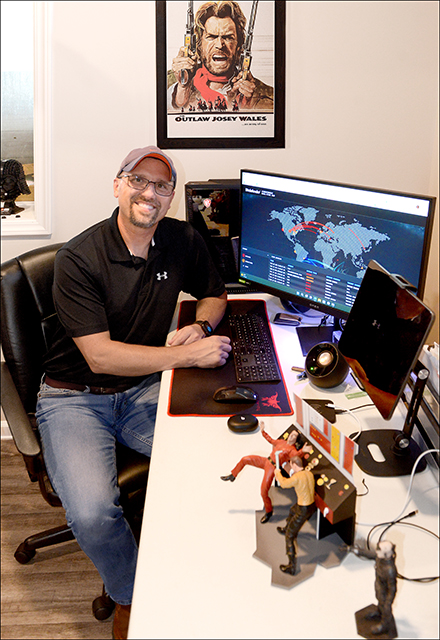
Photo by Rikki Van Camp
Marty earned a degree in information systems at a time when few people had computers in their homes. “We couldn’t take our work home, so we spent all our time in the lab. We were all stuck in the same room together trying to figure stuff out, so it was a lot of collaboration. It was great,” he said.
He studied COBOL (common business oriented language), first developed by the U.S. Department of Defense for data processing in the 1960s, with Sandy Brown and Fortran, another early programming language, with the late Patricia Nettnin.
After graduating, Marty started working at Geneva General Hospital as nursing data coordinator and made sure he had a hand in installing the first computer networks there. “I made it known to everybody that I wanted in, no matter what happened, I wanted to be part of that,” he said.
The knowledge gained there led to his next job at Clifton Springs Hospital and Clinic, though soon he wanted another challenge.
“The best way to learn and get everything I wanted out of my career was to go into consulting and get my hands on everything,” he added.
After a decade consulting, he went to work for the Constellation Brands beverage company, first as a network architect then director of information security. Now at Navitar, he is the entire IT department, and he likes it that way.
“I do like being my own boss or relying on myself. I’m one of those people who, if I don’t know it, I have to know it. I have to figure it out,” he said.

Karen earned associate degrees in information systems and business administration from Monroe Community College in the 1980s and has worked largely in systems administration for health care, telecommunications and manufacturing.
When her son was a senior in high school, Karen reviewed college offerings with him.
“I came across the networking and security program at FLCC, and I thought, ‘That sounds really interesting,’ and those weren’t areas I had ever covered in my training before. So as he was starting college, I went back, too.”
As a working mom, she attended part-time and took mostly evening classes over five years. The classes made her more confident in her current role and gave her more knowledge to draw on as she maintains computer systems and makes updates for security and performance.

For Kimberly, the entry of computers into the workplace changed her life. “I was a bookkeeper and doing ledgers by hand, so when I began using a computer, I thought, ‘Wow. This is amazing.’”
She taught herself enough about computers to gain a foothold in IT in the late 1990s and spent nearly 15 years in the field at Xerox until her job was outsourced in 2014. She qualified for state retraining funds and used it to enroll at FLCC, prompted by years of going “toe-to-toe” with colleagues who had degrees in the field.
“I worked super hard. I’ve been in this field for a long time and had no degree. I wanted to prove that I was good at what I do. The degree was an important milestone and stepping stone for me to say, ‘Guess what? I do belong here.’”
She credits professors Jeffrey Howard and Jonathan Weissman for unfailing support.
“It’s hard not to second-guess yourself in this field. It’s really hard to be confident,” she said. “Professor Weissman said to me that I was the smartest person who didn’t think they were smart that he ever knew. That was very enlightening and helpful for me.”
Discovering IT
Katherine had a knack for technology but never gave IT a thought until she tired of hospitality.
“I started at FLCC right when I was 18, but I really didn’t know what I wanted to focus on. So I took some time off, got some real-world experience and realized it’s tough out there without a degree.”
“My focus was, ‘What can I get a job in?’ because I talked to a lot of other friends and colleagues who don’t use their degrees. And I said, ‘I’m not doing that.’”
Katherine opened an FLCC catalog, flipped through, stopped at IT and thought, “Let’s see what this is all about. I went in with an open mind, hoping to utilize my degree because I was trying to get a good job with benefits and start on my path with a career.”
David came to FLCC initially to enroll in the office technologies certificate program, and Colleen Aiezza in the workforce development office asked him: Why not a degree? Had he thought about IT?
“I found it very rewarding. The difference between high school and college, to me, was huge. The social pressures were gone, the stress was gone, and you actually get to pick the subject matter, so you really enjoy it.”
The networking and cybersecurity program, he said, helped him understand the industry and what his place in it might be.
“It’s like an ice cream store because it gives you tastes of different aspects of IT. There’s server administration, a little bit of cybersecurity, a little bit of forensics, a little bit of hardware. It’s all in there.”
Adam agreed. “Professor Weissman not only has an ability to teach everyone with great understanding, but he pushes you to understand the real world of IT and the IT career field. He pushes industry certifications and their importance,” he said.
Adam earned four certifications – which require an industry-recognized exam – by the time he graduated.
Jonathan said he enjoys getting updates from his students.
“It’s such a gratifying feeling to see my students succeed in industry after graduation and hear that they look back fondly at my classes as the catalyst to their amazing careers,” he said.
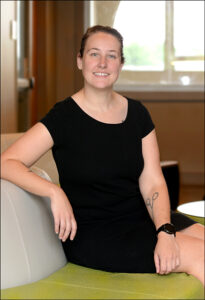
Sam’s entry into the field involved planning and serendipity. The math education program she ultimately left required a couple computer science classes, which got her attention. The four-year college did not offer a computer science major, so she went home to Bloomfield, got a teller job at Canandaigua National Bank and started a mix of FLCC online and night classes in information systems.
One day her boss at the Eastview Mall branch gave her a heads up that the chief of IT for the bank would be visiting.
“My boss said, ‘You need to mention to her that you are going to school for IT right now.’” Sam did exactly that and soon had a temporary posting updating all bank computers to Windows 7, which led to a job on the bank’s helpdesk. A couple years later she was invited to move from computer helpdesk support to the system administration team, where she now works alongside Katherine.
The workplace today
Katherine and Sam say their situation is a bit unusual for an industry where trade publications and think tanks put the percentage of women between 24 and 28 percent.
Katherine was often the only woman in her FLCC classes though she added, “I didn’t feel excluded or left out in any way.” She experienced some gender bias in her first job: “I was once told I was in a meeting to take notes, and that was a little bit of a red flag for me,” she explained. “Coming to CNB has been a breath of fresh air. Our executive IT leader is a woman.”
It helped Katherine to have a role model like Sandy Brown. “She was just so knowledgeable. I listened to her and all of her experiences, and I was like, ‘OK, that could be me right there.’”
Karen encourages women not to shy away from the field. “You should not let the fact that there are more men involved than women slow you down because I do think that’s changing,” she said.
Broadly, IT grads see a few key trends.
“Cloud, cloud, cloud,” said Adam. “Everyone wants everything to run in the cloud, off-site. This is great when looking at physical site security, but when you do not physically control your data, security is always a concern.”
Jonathan agrees that cybersecurity is a growth area for his students.
“Globally, cybercrime costs are estimated to be over $6 trillion per year. The number of unfilled cybersecurity jobs is around 2 million and expected to soar to 3.5 million by 2025,” he said.
David would like to focus his career on cybersecurity, and he also sees a need for people to maintain databases as the foundation of many computer applications. He is quick to add, however, that IT is not all about the tech.
“When somebody comes to me with their computer problem, and I help solve it, I find it really rewarding,” he explained.
Sam stressed how much IT undergirds business processes and decision-making. While she used to troubleshoot hardware problems, now she is looking for ways to use technology to improve the bottom line, for example, finding ways to make the online process for a commercial loan faster and easier.
“There’s a world of difference between someone who is coding all day and someone who is gathering requirements for business needs, and it all falls under the umbrella of IT,” Sam noted.
Katherine’s advice to anyone who wants to get started is to get a two-year degree and show a willingness to learn by getting relevant certifications.
“Even if you got into IT, and you found you didn’t like the direction you were going, you could find another path to go down,” Karen advised. “If anybody loves technical work, IT is an awesome place to be, and it’s a field where you are always learning, and I love that.”

